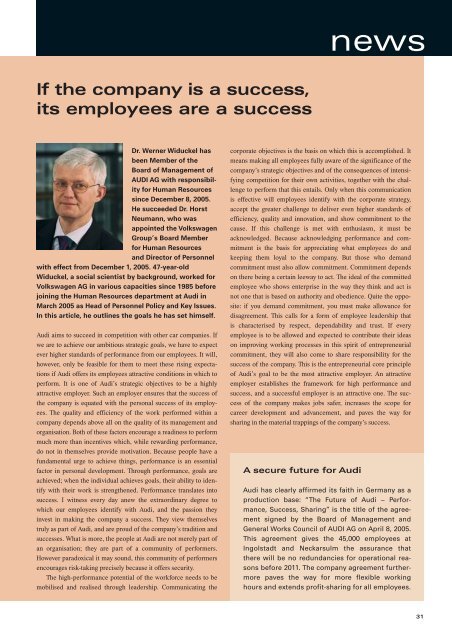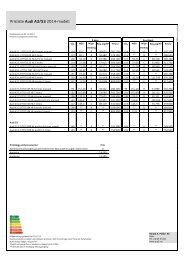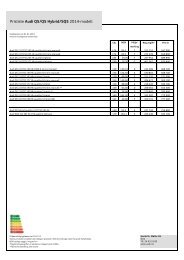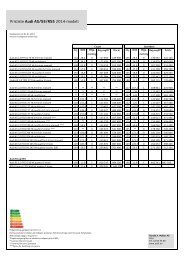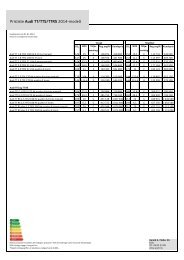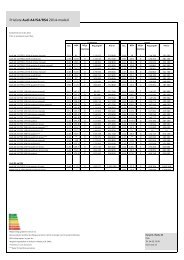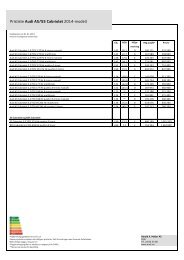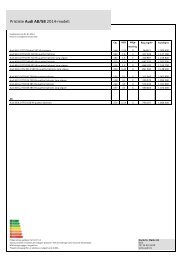Motivating employees to perform - Audi
Motivating employees to perform - Audi
Motivating employees to perform - Audi
Create successful ePaper yourself
Turn your PDF publications into a flip-book with our unique Google optimized e-Paper software.
newsIf the company is a success,its <strong>employees</strong> are a successDr. Werner Widuckel hasbeen Member of theBoard of Management ofAUDI AG with responsibilityfor Human Resourcessince December 8, 2005.He succeeded Dr. HorstNeumann, who wasappointed the VolkswagenGroup’s Board Memberfor Human Resourcesand Direc<strong>to</strong>r of Personnelwith effect from December 1, 2005. 47-year-oldWiduckel, a social scientist by background, worked forVolkswagen AG in various capacities since 1985 beforejoining the Human Resources department at <strong>Audi</strong> inMarch 2005 as Head of Personnel Policy and Key Issues.In this article, he outlines the goals he has set himself.<strong>Audi</strong> aims <strong>to</strong> succeed in competition with other car companies. Ifwe are <strong>to</strong> achieve our ambitious strategic goals, we have <strong>to</strong> expectever higher standards of <strong>perform</strong>ance from our <strong>employees</strong>. It will,however, only be feasible for them <strong>to</strong> meet these rising expectationsif <strong>Audi</strong> offers its <strong>employees</strong> attractive conditions in which <strong>to</strong><strong>perform</strong>. It is one of <strong>Audi</strong>’s strategic objectives <strong>to</strong> be a highlyattractive employer. Such an employer ensures that the success ofthe company is equated with the personal success of its <strong>employees</strong>.The quality and efficiency of the work <strong>perform</strong>ed within acompany depends above all on the quality of its management andorganisation. Both of these fac<strong>to</strong>rs encourage a readiness <strong>to</strong> <strong>perform</strong>much more than incentives which, while rewarding <strong>perform</strong>ance,do not in themselves provide motivation. Because people have afundamental urge <strong>to</strong> achieve things, <strong>perform</strong>ance is an essentialfac<strong>to</strong>r in personal development. Through <strong>perform</strong>ance, goals areachieved; when the individual achieves goals, their ability <strong>to</strong> identifywith their work is strengthened. Performance translates in<strong>to</strong>success. I witness every day anew the extraordinary degree <strong>to</strong>which our <strong>employees</strong> identify with <strong>Audi</strong>, and the passion theyinvest in making the company a success. They view themselvestruly as part of <strong>Audi</strong>, and are proud of the company’s tradition andsuccesses. What is more, the people at <strong>Audi</strong> are not merely part ofan organisation; they are part of a community of <strong>perform</strong>ers.However paradoxical it may sound, this community of <strong>perform</strong>ersencourages risk-taking precisely because it offers security.The high-<strong>perform</strong>ance potential of the workforce needs <strong>to</strong> bemobilised and realised through leadership. Communicating thecorporate objectives is the basis on which this is accomplished. Itmeans making all <strong>employees</strong> fully aware of the significance of thecompany’s strategic objectives and of the consequences of intensifyingcompetition for their own activities, <strong>to</strong>gether with the challenge<strong>to</strong> <strong>perform</strong> that this entails. Only when this communicationis effective will <strong>employees</strong> identify with the corporate strategy,accept the greater challenge <strong>to</strong> deliver even higher standards ofefficiency, quality and innovation, and show commitment <strong>to</strong> thecause. If this challenge is met with enthusiasm, it must beacknowledged. Because acknowledging <strong>perform</strong>ance and commitmentis the basis for appreciating what <strong>employees</strong> do andkeeping them loyal <strong>to</strong> the company. But those who demandcommitment must also allow commitment. Commitment dependson there being a certain leeway <strong>to</strong> act. The ideal of the committedemployee who shows enterprise in the way they think and act isnot one that is based on authority and obedience. Quite the opposite:if you demand commitment, you must make allowance fordisagreement. This calls for a form of employee leadership thatis characterised by respect, dependability and trust. If everyemployee is <strong>to</strong> be allowed and expected <strong>to</strong> contribute their ideason improving working processes in this spirit of entrepreneurialcommitment, they will also come <strong>to</strong> share responsibility for thesuccess of the company. This is the entrepreneurial core principleof <strong>Audi</strong>’s goal <strong>to</strong> be the most attractive employer. An attractiveemployer establishes the framework for high <strong>perform</strong>ance andsuccess, and a successful employer is an attractive one. The successof the company makes jobs safer, increases the scope forcareer development and advancement, and paves the way forsharing in the material trappings of the company’s success.A secure future for <strong>Audi</strong><strong>Audi</strong> has clearly affirmed its faith in Germany as aproduction base: “The Future of <strong>Audi</strong> – Performance,Success, Sharing” is the title of the agreementsigned by the Board of Management andGeneral Works Council of AUDI AG on April 8, 2005.This agreement gives the 45,000 <strong>employees</strong> atIngolstadt and Neckarsulm the assurance thatthere will be no redundancies for operational reasonsbefore 2011. The company agreement furthermorepaves the way for more flexible workinghours and extends profit-sharing for all <strong>employees</strong>.31


